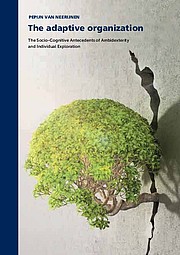The Adaptive Organization: The Socio-Cognitive Antecedents of Ambidexterity and Individual Exploration Defended on Monday, 12 September 2016
In order to remain a high level of environmental fitness an organization must be able to simultaneously explore and exploit. As these activities are contradictory in nature this generates significant pressures within the organization. In particular, because long-term adaptation requires not only the simultaneous pursuit of exploration and exploitation but also their combination. Top-management and employees have to manage this differentiation and integration challenge, despite their natural inclination to shy away from it as it is emotionally charged and cognitively demanding.
This dissertation focuses on the influence of socio-cognitive factors such as reflexivity, transactive memory systems, and paradoxical cognition as antecedents to organizational ambidexterity and individual exploration. These factors effect the information processing and learning behaviours and thus their willingness and ability to successfully deal with these tensions.
Jointly the studies in this dissertation underscore the importance of the socio-cognitive antecedents of ambidexterity. Much insight has already been gained by studying factors related to organizational design or top management team characteristics. Greater attention to the socio-constructionist underpinnings of the management of the ambidexterity paradox can further extend our knowledge on this important area. This dissertation represents one of the first steps in this direction.








